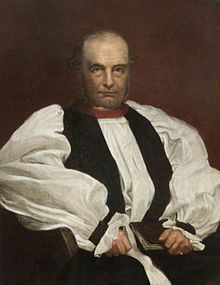William Connor Magee
|
The Most Reverend and Right Honourable William Connor Magee |
|
|---|---|
| Archbishop of York | |
 |
|
| Province | Province of York |
| Diocese | Diocese of York |
| Installed | 17 March 1891, York Minster |
| Term ended | 1891 (died) |
| Predecessor | William Thomson |
| Successor | William Maclagan |
| Other posts | Bishop of Peterborough (1868–1891) |
| Personal details | |
| Born |
12 December 1821 Cork, Ireland |
| Died | 5 May 1891 (aged 69) London |
| Buried | Peterborough Cathedral |
| Denomination | Anglican |
| Spouse | Anne Nisbitt Smith (m.1851) |
| Education | Kilkenny College |
| Alma mater | Trinity College, Dublin |
William Connor Magee (17 December 1821 – 5 May 1891) was an Irish clergyman of the Anglican church, Bishop of Peterborough 1868–1891 and Archbishop of York for a short period in 1891.
He was born in Cork, Ireland. His father was a minor canon of St Fin Barre's cathedral, Cork and a curate of the parish attached to the Anglican cathedral; his grandfather was William Magee, Archbishop of Dublin. Young Magee was educated at Kilkenny College and entered Trinity College, Dublin with a scholarship at thirteen.
He was ordained in 1844 to the curacy of St Thomas's, Dublin, but, being threatened with tuberculosis, went after two years to Málaga, Spain. On his return he took a curacy at Bath, England (1849–1851) and was soon appointed to the Octagon Chapel (1851–1860), where his fame both as preacher and platform speaker continued to spread. Some years afterwards he was made prebendary of Wells Cathedral. In 1860, poor health caused him to accept the living of Enniskillen, Ireland. In 1864 he was made Dean of Cork and in 1866, additionally, Dean of the Chapel Royal, Dublin Castle, and a chaplain to the Lord Lieutenant. Here he showed those great gifts which ultimately raised him to high office; a powerful grasp of mental, moral and political problems, combined with eloquence of a high order, illuminated with brilliant flashes of wit.
In 1868 the question of the disestablishment of the Irish Church came to the fore, and Magee threw himself into its defence with his usual energy and vivacity. The success of his orations caused Prime Minister Benjamin Disraeli to offer him the bishopric of Peterborough, England. He justified his appointment by his magnificent speech when the Disestablishment Bill reached the House of Lords in 1869, and then plunged into diocesan and general work in England. He preached three remarkable sermons on Christian Evidence in Norwich Cathedral in 1871. He took up the temperance question, and declared in the House of Lords that he would rather see "England free than England compulsorily sober," a statement which was misquoted and attacked.
...
Wikipedia
